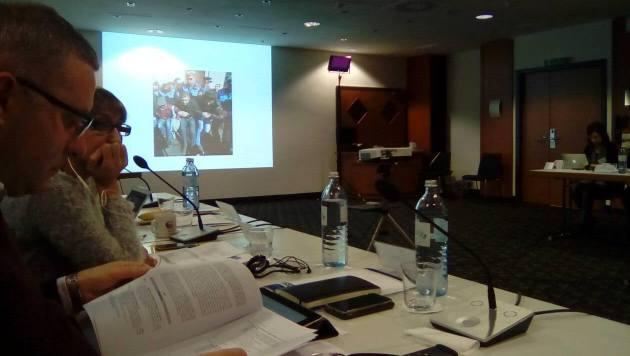NGO representatives from 20 countries attend ODIHR/OSCE round table on monitoring demonstrations and keeping them nonviolent

Last month the Office for Democratic Institutions and Human Rights (ODIHR) of the Organization for Security and Cooperation in Europe (OSCE) held a three-day round table on the topic of monitoring public assemblies and demonstrations during which representatives of nonprofits from 20 countries, including a representative of the ROMEA organization in the Czech Republic, presented their experiences with monitoring demonstrations and working with local authorities and police during public assemblies. Roughly 35 representatives from 20 countries worldwide attended.
In addition to NGOs from Belarus, the Czech Republic, Germany, Hungary, Macedonia, Turkey, Ukraine, the United Kingdom, the USA and several other states, leading representatives of the OSCE/ODIHR also participated. “The meeting with the representatives of so many organizations involved in upholding human rights was a brilliant opportunity to gain insight into the everyday reality of some states where people who fight for democratic values risk ending up in prison because the regime finds them inconvenient,” said Jitka Votavová of ROMEA.
During the round table, the ROMEA representative gave a presentation about the NGO’s media “watchdog” activities – the systematic monitoring of how the Czech mainstream media covers topics associated with the Romani minority and whether the coverage is balanced or biased. Votavová also presented information about the legal background to public demonstrations in the Czech Republic, recommendations about such events, good practices, and also specific examples of monitoring such events directly in the field, such as the demonstrations against refugees or against Romani people that are convened by the ultra-right.
The ROMEA staffer also talked about the tradition of counter-demonstrations convened to blockade neo-Nazi marches. Representatives from other states also contributed their experiences from monitoring demonstrations and public events, including how they communicate with police and representatives of local administrations.
In addition to criticism of police work and controversial police interventions against demonstrators nonviolently blockading neo-Nazi marches, examples were given of good practices and strategies for maintaining the nonviolent character of demonstrations. ODIHR provides support to civil society in participating States with advocating for democratic principles and human rights, as well as arranging for the monitoring of demonstrations or elections should there be a risk that human rights might be violated during such public processes.
ODIHR also offers training programs for government bureaucrats and representatives of law enforcement or NGOs on how to effectively monitor whether human rights are being upheld. The monitoring report that ODIHR published on freedom of assembly in selected OSCE participating States from April 2015 – July 2016 is available here.